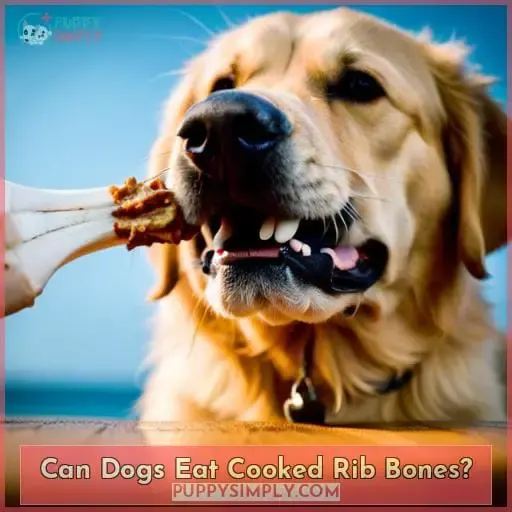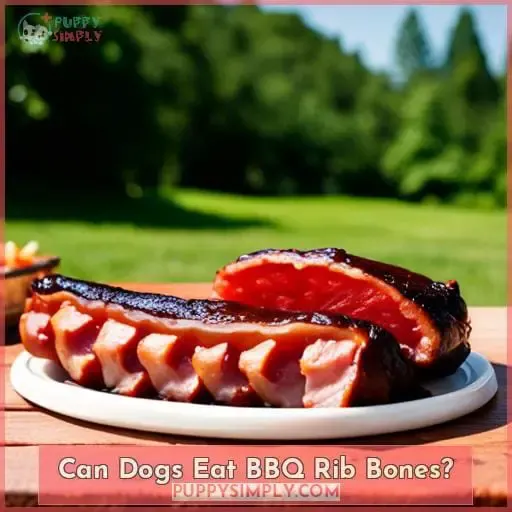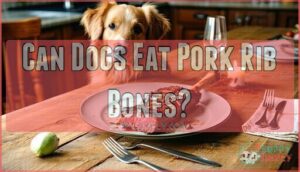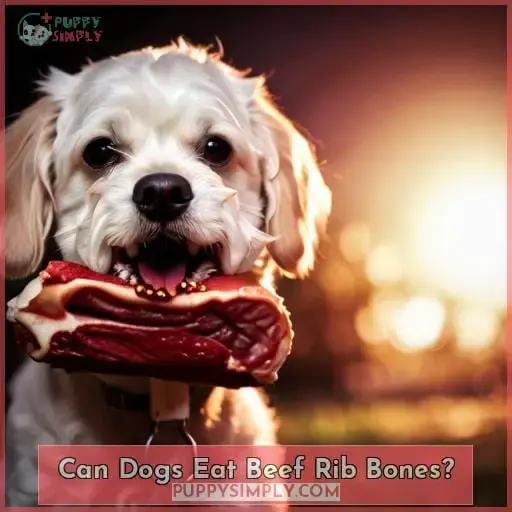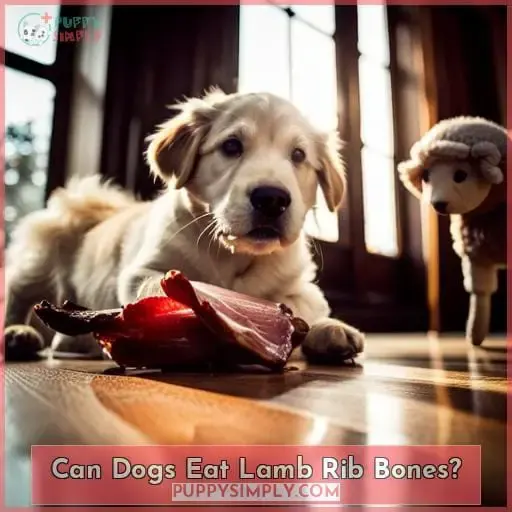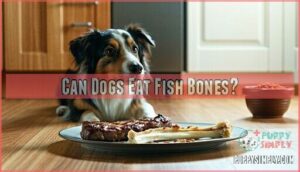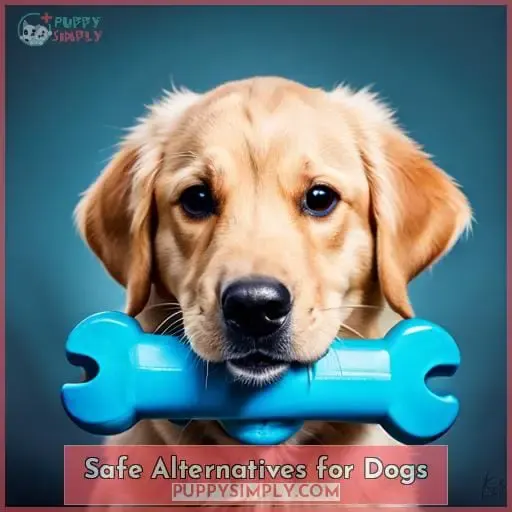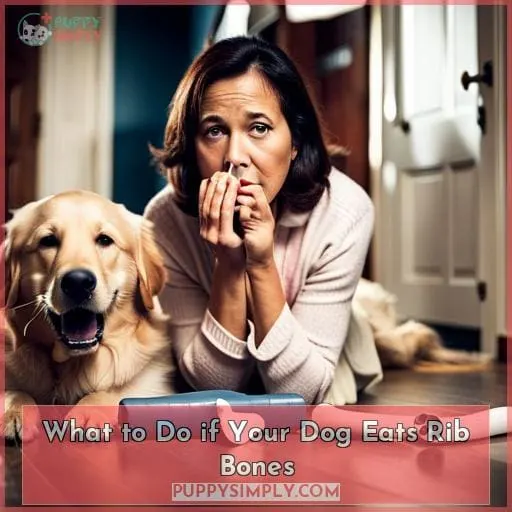This site is supported by our readers. We may earn a commission, at no cost to you, if you purchase through links.
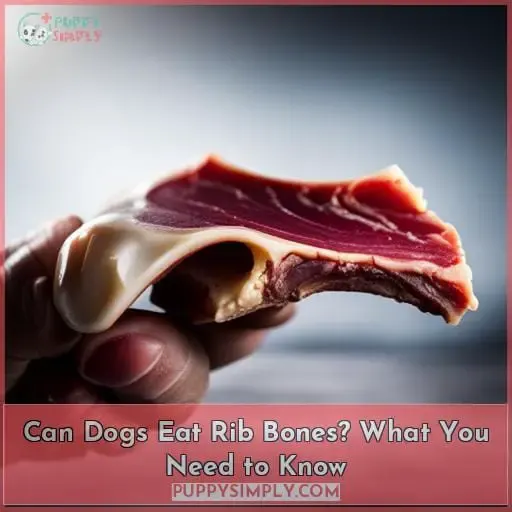 Do you have a pup that loves to chew? You might be tempted to give them rib bones, but it’s important to know the risks before deciding if this is safe. Can dogs eat rib bones? The short answer is no. Raw and cooked poultry or pork ribs should not be given as they can splinter into shards, which can cause your dog choking, mouth, throat, or intestinal damage.
Do you have a pup that loves to chew? You might be tempted to give them rib bones, but it’s important to know the risks before deciding if this is safe. Can dogs eat rib bones? The short answer is no. Raw and cooked poultry or pork ribs should not be given as they can splinter into shards, which can cause your dog choking, mouth, throat, or intestinal damage.
Short uncooked beef and lamb ribs may sometimes be offered under careful supervision on a surface that can easily be cleaned up, like linoleum or tile. However, there are potential health risks associated with these too. If your dog has eaten any kind of bone without supervision, then seek veterinary advice immediately as there could potentially be dangerous consequences for your pet’s health.
Read on for more information about what types of bones are safe (or unsafe) for canine consumption!
Table Of Contents
- Key Takeaways
- Can Dogs Eat Short Rib Bones?
- Can Dogs Eat Cooked Rib Bones?
- Can Dogs Eat BBQ Rib Bones?
- Can Dogs Eat Pork Rib Bones?
- Can Dogs Eat Beef Rib Bones?
- Can Dogs Eat Lamb Rib Bones?
- Can Dogs Eat Bird Bones?
- Can Dogs Eat Fish Bones?
- Safe Alternatives for Dogs
- What to Do if Your Dog Eats Rib Bones
- Frequently Asked Questions (FAQs)
- Conclusion
Key Takeaways
- Rib bones, especially from pork and poultry, are unsafe for dogs due to the risk of splintering.
- Smoked and seasoned bones contain harmful ingredients like sugar and should be avoided.
- Chewing bones can provide stimulation, but the risks, such as choking and splintering, outweigh the benefits.
- Instead of bones, consider alternatives like bully sticks and rubber chews to reduce the risk of splintering.
Can Dogs Eat Short Rib Bones?
Choosing to give your canine companion short rib bones can be a tricky decision due to the potential risks involved. This is especially true if you have a small dog or puppy or one of the flat-faced breeds, who are more prone to choking and other dangers associated with bone chewing.
It’s essential that owners understand these risks before giving their pet any type of bone treat.
Risks and Dangers of Short Rib Bones
You should be aware of the potential risks associated with providing your pet short rib bones as a treat, since cooked or raw bones can lead to dangerous splintering and other health concerns.
- Raw pork ribs are especially hazardous due to the salmonella risk.
- Lamb bones may have less risk of splintering than cooked ones but still need monitoring for stomach upset in some cases.
- Smaller breeds are at a higher risk of choking on fishbones – seek vet guidance before feeding them any type of fishbone treat!
- Smoked or seasoned ribs contain ingredients such as sugar, which can be harmful if long-term consumption occurs, so avoid them altogether!
- Monitor closely while allowing the dog to chew any types of bones; intervene immediately if concerned about pain or choking.
Potential Risks for Small Dogs and Puppies
Due to their size and flat faces, small breeds and puppies are at an even greater risk of injury from short rib bones. These bones may splinter more easily than larger ones when chewed raw, causing severe mouth or throat damage which can lead to blockage in the intestines if swallowed.
Eating unsupervised also poses a major hazard as signs of pain or choking are harder for owners to spot in smaller dogs. Chewing on bone alternatives like bully sticks is safer but still needs supervision as they can be ingested whole and cause intestinal obstruction too.
Owners should monitor their pet’s chewing habits closely with any type of bone given; intervening immediately if there are any concerns about safety issues arising from eating it raw or unsupervisedly swallowing large pieces that could block intestines.
Risks for Flat Faced Breeds
Flat-faced breeds are particularly susceptible to the dangers of bone chewing, so extra care must be taken when allowing them to chew. Digestion rates vary between each individual dog, and flat-faced dogs may have difficulty with large pork rib bones.
Lamb or other small meat bones can provide a safer alternative, although they should still be monitored closely for signs of distress. Fish bones also pose a choking risk and should only be given under veterinary guidance.
Raw spare ribs carry an increased risk due to their size and potential splintering, but cooked ones are just as dangerous, if not more so, due to the likelihood of breaking apart into sharp pieces that could cause serious damage if ingested by a flat-faced breed dog.
With any type of bone, it’s important for owners to take precautionary measures to ensure their pet’s safety from injury or illness caused by ingesting pieces that could present risks such as salmonella poisoning or intestinal blockage.
Can Dogs Eat Cooked Rib Bones?
It’s important to know that cooked rib bones can be dangerous for dogs. There is a risk of splintering, which can lead to mouth, throat, and intestinal damage, as well as potential emergency situations if ingested.
Raw pork and rib bones are especially hazardous due to the possibility of salmonella contamination, in addition to the other risks mentioned above.
Why Cooked Rib Bones Are Unsafe
Cooking rib bones can make them more likely to splinter, potentially causing damage to the mouth and throat if swallowed. Uncooked pork ribs are especially risky; while lamb bones may be safer raw than cooked, they should still be monitored for stomach upset.
Chewing provides mental stimulation but has significant risks. Safer alternatives include rubber chews or bully sticks instead of any type of bone eating. Fish bones pose a choking hazard as well, even when cooked. Seek vet guidance before feeding these types of treats.
Monitor your pup closely during chewing sessions and intervene if there are any concerns. Signs such as pain or choking could indicate that an unsupervised ingestion occurred, so contact your veterinarian right away! While dogs love chewing on bones, the potential hazards usually outweigh their benefits.
Risk of Splintering and Injuries
You should be aware of the potentially dangerous splintering that can occur when cooked rib bones are given to your pup, which could result in serious injury.
- Monitor digestion time for bone safety.
- Intervene if any concerns arise with bone chewing.
- Provide alternatives such as bully sticks or rubber chews instead of bones.
- Avoid BBQ or seasoned bones due to added ingredients like sugar & garlic/onion powder.
Small dogs and puppies are at a higher risk than larger breeds when it comes to inhaling a splintered bone fragment.
Potential Emergency Situations
If your pup has eaten cooked rib bones, monitor for signs of pain or choking as this could be a potentially life-threatening emergency. Chewing hazards can cause bone splintering and digestion problems, leading to surgery or even death.
There is also a risk of salmonella with raw pork and ribs. Bully sticks are a safer alternative than cooked bones – check pieces that are safe before feeding them to your dog. To ensure the highest level of safety, provide only supervised access to any treats containing bone material while monitoring for any unusual behavior that could indicate an emergency situation, such as vomiting or difficulty breathing.
Can Dogs Eat BBQ Rib Bones?
Though BBQ ribs may seem like a tasty treat for dogs, there are several hazards associated with them that owners should be aware of. The ingredients used to season the bones can cause harm to your pup’s health, and even if cooked correctly, the risk of splintering is still present.
Therefore, it’s wise to avoid giving your dog any sort of BBQ rib bone as a snack or chew toy in order to keep them safe from potential risks.
Hazards of BBQ Rib Bones
BBQ rib bones can be extremely dangerous for your pup, as they’re more likely to splinter and cause serious damage. The ingredients used in barbecuing, such as sugar, garlic, and onion, can also make them unsafe.
Dogs of all sizes may have difficulty digesting short ribs due to the variance in their digestive systems.
Chewing on bone provides mental stimulation, but it’s important to provide safer alternatives like bully sticks or rubber toys instead of bones when possible – especially for small dogs and puppies who are at a higher risk from hazards such as these.
Baby back ribs should never be given to dogs, no matter how tempting it might seem.
Ingredients to Avoid in BBQ Bones
Avoid giving your pup BBQ bones as they can contain ingredients like sugar, garlic, and onion, which are unsafe. These ingredients can cause serious health issues in dogs, such as vomiting, diarrhea, loss of appetite, or difficulty breathing.
For puppies and small breeds, the risk is even higher due to their size, so it’s best to seek vet guidance before feeding them any kind of bone treat. Puppies may not be able to handle these ingredients, causing more severe reactions than an adult dog would experience if ingested.
Potential Health Risks
You should be aware of the potential health risks associated with giving your pet BBQ ribs bones, as they may splinter and cause serious damage to their mouth, throat, or intestine. Monitor dogs closely when allowing bone chewing and intervene if any concerns arise.
Seek vet guidance for fish bones to avoid choking hazards. Consider safe alternatives like bully sticks or rubber chews instead of raw pork or poultry bones, or cooked ones which are more likely to splinter.
Monitoring digestion and intervening as needed can help reduce risk, but it’s worth considering other options due to safety issues that come along with bone chewing – especially for small dogs, puppies, and flat-faced breeds who have a higher risk profile than others.
Can Dogs Eat Pork Rib Bones?
You’re probably wondering if pork rib bones are safe for your pup. The answer is that it depends on whether the bones are cooked or raw, as there are different risks associated with each form.
Raw pork rib bones can easily splinter and cause serious damage to a dog’s mouth, throat, and intestine. Furthermore, there is a risk of salmonella contamination when consuming them in this state.
Cooked ribs may be less likely to splinter, but they still pose an injury risk due to their hardness. Therefore, owners should monitor their dogs closely for any signs of stomach upset or distress after consumption.
Safety of Pork Rib Bones
Pork rib bones can be dangerous for your pup, so it pays to err on the side of caution and look before you leap. Bone safety depends on several factors such as shape, size, and density. Smaller ribs will break more easily than larger ones.
Chewing time affects digestion rate – long chewing sessions mean longer digestion times, which could cause intestinal blockages if swallowed whole or in large chunks. Flat-faced breeds should avoid these treats due to their increased risk of choking or digestive issues resulting from eating bones that are too large for their smaller jaws.
Risks of Raw and Cooked Pork Rib Bones
It’s important to be aware that raw and cooked pork rib bones may splinter, potentially causing severe damage if ingested. Pet safety should be a top priority. Their digestion variability can make them more susceptible to bone hazards.
Choosing rib bones of appropriate size for your pet is essential. The shape of ribs makes them particularly hazardous as they tend to get stuck in the throat or intestine easily. Additionally, it’s vital that you monitor pets when allowing access to any type of bone chew.
Monitoring for Stomach Upset
Monitor your pet closely after providing bone alternatives, as digestion of bones can vary greatly between dogs; even a small piece has the potential to cause stomach upset. To assess if your dog is likely to experience any digestive issues, consider the time it takes for them to digest the size and type of bone they are eating and the wear on their teeth from chewing.
Furthermore, look into how much stomach acid is produced when consuming large chunks of meat or bones. Lastly, check with a vet whether dental health will be impacted by giving bones as treats regularly.
Can Dogs Eat Beef Rib Bones?
Considering giving your pup beef rib bones? Even though they may look like a tasty treat, there are potential risks and hazards associated with them. Monitor closely for splintering of the bone as this can lead to choking or intestinal blockage.
If you’re looking for an alternative, try bully sticks or rubber chews instead – these provide mental stimulation without the risk of splintering.
Potential Risks and Hazards
Be mindful of the potential risks associated with giving your pup beef rib bones, as they can be just as hazardous – if not more so – than pork ones. Splinter risk, bone digestion issues, and choking hazards are all cause for concern.
Seek vet guidance before feeding any type of bone. Monitor closely when allowing to chew them; intervene immediately if any concerns arise. Safer alternatives include bully sticks or rubber chews for mental stimulation instead.
BBQ or seasoned bones should be avoided due to ingredients like sugar, garlic, and onion which can lead to serious health complications in dogs. Flat-faced breeds and small puppies may have an even higher chance of suffering from these risks due to their size difference compared to other pups.
Monitoring for Splintering
You should always watch for signs of splintering when your dog is chewing on beef rib bones, as the chance of them breaking into sharp pieces and causing mouth or throat damage is significant.
Monitor closely to ensure bone digestion occurs safely; if any concerns arise, seek vet advice immediately.
Consider safer alternatives such as bully sticks or rubber chews to reduce the risk of bone hazards.
Flat-faced breeds and small dogs are particularly at risk from these dangers, so take extra precaution with these pups!
Exercise caution when providing bones: check regularly for splinters and monitor digestion carefully – this could make all the difference in avoiding a painful emergency situation down the line.
Alternatives to Beef Rib Bones
Safe options for canine chewing might include bully sticks and rubber chews, so you can give your pup the enjoyable activity without the risk of splintering. Lamb bones are relatively safer than beef rib bones, but still need to be monitored closely as raw ones pose less risk of splintering compared to cooked.
Fish poses a choking hazard due to its small size; always seek vet guidance before feeding it. Bone digestion varies from dog to dog depending on size and health; monitor them closely when providing any type of bone alternative or treat.
While dogs love chewing on bones, hazards generally outweigh benefits – keep BBQ or seasoned out due to their added ingredients like sugar and garlic that can be harmful if ingested in large quantities!
Can Dogs Eat Lamb Rib Bones?
You may be wondering if it is safe for your pup to eat lamb rib bones. This article will discuss the safety of raw and cooked lamb rib bones, as well as the potential risks associated with giving these treats to your dog.
Before providing any type of bone treat, you should first understand the possible dangers that come along with them so you can make an informed decision on what’s best for your furry friend.
Safety of Lamb Rib Bones
Lamb rib bones may appear relatively safer, but it’s still important to closely monitor your pup while they chew. Lamb digestion varies greatly between dogs depending on size and health, and flat-faced breeds are at a higher risk of potential splintering or obstruction hazards.
Puppy safety is paramount – consider bone alternatives such as bully sticks or rubber chews for younger canines instead. While these treats provide mental stimulation without the same risks associated with chewing raw ribs, always intervene if signs of pain or choking occur unsupervised.
Raw Vs. Cooked Lamb Rib Bones
Comparing raw and cooked lamb rib bones can be tricky – both have their own risks to consider. For small dogs, raw bones are generally considered less splintering risk than when they’re cooked, but it’s important to keep in mind the hazards of pork.
A 4-item numeric list would highlight:
- Raw ribs pose a salmonella risk.
- Cooked ribs can still splinter.
- Small dogs face greater danger.
- Pork carries additional hazards.
Lamb safety should always remain top priority for owners looking for chew options due to its potential health effects on puppies and flat-faced breeds. It is best practice not to feed any bone without supervision or vet guidance as emergency surgery or death may result from ingestion of unsafe chews such as BBQ or seasoned ones containing sugar, garlic, onion, etc.
Can Dogs Eat Bird Bones?
When it comes to bird bones, there are serious risks involved. Some dogs may be at risk of choking if they consume them, so it’s important to seek guidance from your veterinarian before giving any bone treats.
Though birds have small bones that can seem like a safe snack option for some breeds of dogs, the dangers outweigh the potential benefits and should not be taken lightly.
Risks of Bird Bones
Bird bones can be a hazardous choice for some canine companions due to the risk of splintering and possible obstruction. Salmonella risk is also present, so avoid giving bird bones as treats. Bone digestion and chewing vary greatly between dogs, with small breeds or puppies at a higher risk from bone hazards.
Gulping down even small pieces of bird bone may cause choking or stomach upset; consider safer alternatives like rubber chews or bully sticks instead.
Choking Hazard for Some Dogs
Be aware that even fish bones can pose a choking hazard for some dogs, so seek your vet’s guidance before feeding them. Monitor your dog closely when giving any type of bone and intervene if there are any concerns.
To avoid the risks associated with splintering or swallowing bones, consider offering safe alternatives such as bully sticks and rubber chews instead. Seek out vet advice on avoiding potential hazards from bird bones while still providing mental stimulation to your pet.
Finally, always keep an eye out for signs like pain or choking if you suspect unsupervised bone consumption – contact a veterinarian immediately in these cases!
Seeking Veterinary Guidance
It’s important to consult with your vet before feeding bird bones, so you can be sure they’re safe for your pup. Bone digestion varies between dogs, and the size of the bone can pose a choking hazard. Monitor them closely when giving any kind of bone or alternative chew, and intervene if there are concerns.
Alternatives such as bully sticks or rubber chews provide mental stimulation without the risk associated with bones. However, it’s essential to seek guidance from a veterinarian first for advice on what’s suitable based on their breed, health status, and size.
Always avoid BBQ or seasoned bones due to ingredients like sugar, garlic, and onion that may cause illness in some pups!
Can Dogs Eat Fish Bones?
It is important to be aware of the risks associated with feeding fish bones to your dog. Fish bones may cause choking, as well as other potential hazards due to their size and shape. It is advisable that you consult with a veterinarian before giving any type of bone treat or snack to your pet.
Knowing ahead of time what could be potentially hazardous can help keep them safe and healthy in the long run.
Potential Hazards of Fish Bones
Fish bones can pose a choking hazard to some dogs, so it’s important to keep an eye on your pup when they’re chewing. Dog size and their ability to digest bones vary greatly, and larger breeds tend not to be affected by bone splintering.
However, small dogs or puppies are at a higher risk of emergency surgery if they ingest fish bones.
Bone chewing provides mental stimulation but carries risks. Safer alternatives include bully sticks and rubber chews that won’t splinter or cause potential health issues.
Choking Risk for Dogs
You must watch your pup closely when they’re chewing fish bones, as the sharp edges can present a choking hazard and cause them distress.
Bone digestion and size vary greatly between dogs, so it’s important to take extra precautions with bone safety. Alternatives to consider include bully sticks or rubber chews. However, monitor their usage for any signs of discomfort or pain.
Choking risks should also be taken into account when allowing bone chewing. Flat-faced breeds and small puppies may have difficulty with larger pieces that could get lodged in their throats if not properly supervised.
Consulting With a Veterinarian
Before deciding whether or not to allow your pup to chew on fish bones, it’s wise to consult with a veterinarian. They can provide advice based on your dog’s chewing habits and digestion of bones. A vet will also be able to discuss potential risks associated with ingestion, such as choking hazards or digestive upset.
Additionally, they may suggest alternative treats that could satisfy the need for mental stimulation without risking any health issues related to bone consumption.
Safe Alternatives for Dogs
Not sure what to give your pup to chew on? Bully sticks and rubber chews are safer alternatives that offer mental stimulation for dogs. Instead of giving bones as treats, consider seeking vet-approved options that provide the same benefits without putting them at risk of splintering or other hazardous side effects.
With a little research and guidance from your veterinarian, you can find an appropriate option for your pet.
Bully Sticks as a Safer Option
Instead of bones, provide your pup with a tasty and safer alternative like bully sticks for mental stimulation. Bully sticks are an excellent chew safety option as they do not splinter or cause bone-related injuries.
They also promote pet health by ensuring no salmonella risk from raw meat consumption.
Pet owners should still seek vet guidance when providing food alternatives to their pets for the best results.
Rubber Chews for Mental Stimulation
Rubber chews provide a great way to keep your pup entertained and engaged while avoiding the risks associated with bone chewing.
The rubber texture is gentle on their teeth but still provides enough resistance to satisfy their need for mental stimulation. Not only do these treats help promote dog safety by preventing splintering or choking hazards from bones, but they also support good mental health as an outlet for natural behaviors like gnawing and chewing.
Investing time into researching the best chew toys designed specifically with your pet’s safety in mind will ensure they get plenty of exercise without any of the worry associated with giving them potentially dangerous bones.
Seeking Vet-Approved Alternatives
Check with your vet for safe alternatives to raw and cooked bones that will provide the same mental stimulation for your pup. Risk factors vary by breed, size, and health of your dog, so getting professional advice is key.
Here are some great options recommended by vets:
- Bully sticks as a digestible chew snack
- Rubber chews specifically designed to last longer
- All-natural treats like carrots or apples without seeds or stems
- Fish-based snacks not containing any sharp bones that could cause choking.
Remember to always monitor dogs when they’re chewing anything, even if it’s deemed safe.
What to Do if Your Dog Eats Rib Bones
If you’re concerned that your dog has eaten rib bones, it’s important to be aware of the signs of pain or choking, as well as when to contact a veterinarian. Intervention and monitoring are also key to keeping your pup safe; make sure you know what steps to take if any issues arise.
Signs of Pain or Choking
Watch for signs of pain or distress if your pup has been chewing a bone, such as excessive drooling or gagging – it’s not worth taking chances. Signs like these could indicate that the rib bones are causing an obstruction in their digestive tract and they should be monitored closely.
If sensitivity is present, then seek emergency care right away. The digestion time for any type of bone can vary greatly from dog to dog depending on size and diet restrictions, so risk assessment is key with this kind of activity.
It’s best to avoid giving them rib bones altogether, but if you do, create a safe environment where they can chew them under supervision.
Contacting a Veterinarian
If you’re concerned about what your pup may have eaten, contact a vet right away. Veterinary advice can help assess any potential risks and prevent further harm from bone digestion or splinter risk. Factors such as size, breed, and health should be considered when assessing the risk of bone chewing.
Smaller dogs or flat-faced breeds are at a higher risk than larger ones due to their size and anatomy, respectively. Knowing these factors allows for informed decisions on providing alternatives that are safer than bones while still offering mental stimulation to your pup.
If an incident has already occurred, seek veterinary care immediately. Monitor closely for signs of pain or choking if unsupervised ingestion happened before seeking medical attention.
Intervention and Monitoring
Intervene promptly if your pup shows any signs of distress while chewing bones, as raw pork and rib bones in particular can splinter and become a choking hazard.
It’s wise to seek vet guidance before feeding fish bones due to the risk of choking. When it comes to bone alternatives, bully sticks and rubber chews provide mental stimulation without the same dangers associated with real bones.
Above all else, intervene if there are concerns about what your dog is eating – even when supervised – as this could prevent serious medical complications down the road!
Frequently Asked Questions (FAQs)
Is it safe for my dog to eat rib bones?
No, it is not safe for your dog to eat rib bones. They can splinter and cause serious damage or even death if ingested. Monitor closely when providing any type of bone as a chew and look out for signs of pain or choking.
Speak with your vet if you have any concerns about what types of bones are safest for your pup.
How long can my dog safely chew on a rib bone?
It’s best to avoid giving rib bones to your dog due to the risk of splintering. Monitor closely if you do allow them and intervene if any concerns arise.
Are rib bones a good source of nutrition for my dog?
Rib bones may provide some nutrition to your dog; however, the risks associated with them outweigh any potential benefits. To ensure safety and well-being, consider more suitable alternatives such as bully sticks or rubber chews.
What should I do if my dog swallows a rib bone?
If your dog has swallowed a rib bone, act quickly! Seek immediate veterinary assistance to prevent potential serious health complications and even death. Don’t wait – time is of the essence! Be sure to monitor your pup closely in case of any pain or choking and intervene if necessary.
Are there any risks associated with giving my dog rib bones?
Yes, there are risks associated with giving your dog rib bones. Although they may enjoy the mental stimulation from chewing them, splintering and possible ingestion of raw pork or poultry can lead to surgery or even death.
Conclusion
It’s a natural urge for dogs to chew on bones, but when it comes to rib bones, it’s best to stay away.
As the risks and dangers of short rib bones, especially for small dogs and puppies, and flat-faced breeds, are just too great. Cooked rib bones, BBQ rib bones, pork rib bones, beef rib bones, lamb rib bones, bird bones, and even fish bones all pose significant hazards.
While it can be difficult to deny our canine companions the joy of a good bone chew, the best course of action is to provide safer alternatives like bully sticks and rubber chews that will provide mental stimulation without the risk of splintering or other damaging side effects.
When it comes to rib bones, it’s best to err on the side of caution.

